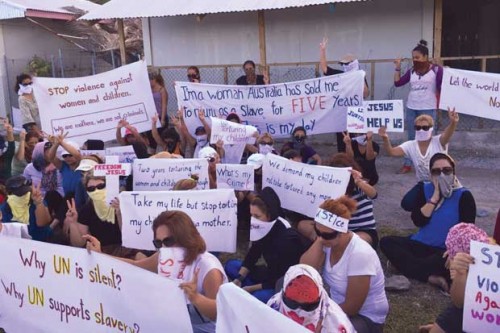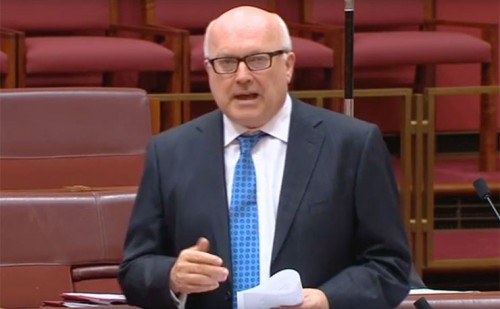The Australian economy is addicted to coal, carnage and cages – and they are all big business.
But as divestment and boycott campaigns continue to score major wins, they have also attracted a range of responses from across the political spectrum, from calls to invest in supposedly clean coal or nicer cages, to the insistence that investments in those industries is compulsory or inescapable.
In Australia, the same companies will reap profits at various points in the supply-chain of horribly damaging activities, from the bombing raids in the Middle East that precipitate the flight of people from uninhabitable cities, to the coal mines that throw people off lands, to the detention centres and prisons that make money from locking up those very same people.
Transfield and Serco are not only the two largest contractors in the detention industry that sprung up around the policy of mandatory detention and the growth of private prisons. They are also major recipients of Australian Defence contracts and, in Transfield’s case, a significant player in the mining industry.
Boycott and divestment tactics have become powerful, wildfire tools of social change movements in recent years.
They illustrate the extent to which those movements have indeed become as global as mining, war and detention corporations and, at the same time, as distributed as every financial transaction.
Despite the best efforts of successive governments to detain people in remote areas and in other countries, those industries are accessible to opponents in the form of audience tickets to a cultural event such as the Biennale of Sydney, or the immense financial weight of institutional investors and pension funds such as HESTA.
As Jamie Henn from 350.org put it in the wake of the Australian National University’s decision to dump its mining company holdings in October last year, “People instantly understood the power of challenging institutions to put their money where their mouths are.”
Divestments and boycotts are not symbolic actions. They are practical campaigns with material effects that are accessible to everyone. The Universities of Newcastle and Wollongong both have contracts with Transfield Services. Given this, it is notable that students in the group Columbia Prison Divest celebrated their efforts in persuading Columbia University’s decision to dump its big shareholdings in G4S and Corrections Corporation of America (CCA).

Both G4S and CCA have been big players in the detention of migrants in the United States, as well as in Australia. G4S was the contractor on the Manus Island detention centre before the contract was transferred to Transfield.
Before being rebranded as G4S through a history of mergers, its first iteration was as the US company Wackenhut, which had contracts to run all of Australia’s migration detention centres since 1997 onwards.
The first contract CCA won in the United States was for an immigration detention centre in Houston, Texas. These are global systems, but they are also localised in particular arrangements such as Transfield’s contracts with Newcastle and Wollongong universities.
As with coal, these are companies whose social and environmental costs are only sustainable for the investors and companies for as long as they are borne by others and externalised onto bodies and lives that exist off the balance sheet.
But it is also important to underline the extent to which the standardisation of those downside risks, including in the form of ethical codes of corporate conduct, merely enables those companies to continue to engage in inherently damaging practices, whilst managing the shape and absorbing the cost of opposition in the form of larger contract dollar amounts.
The equivalent to a detention centre ‘human rights’ code of conduct in the coal industry is ‘clean’ coal technology. Both re-route concerns over the downsides of coal and cages into efforts that further delay complete divestment from practices that are predictably and inherently damaging.
The Sydney Biennale’s decision in 2014 to break with a long-standing sponsor, Transfield, and the subsequent Belgiorno-Nettis divestment from Transfield Services, illustrated the importance of knowing how corporations and financial markets work, raising the stakes and taking an unequivocal stance.
So too does the recent decision by another large institutional shareholder in Transfield Services, the superannuation fund HESTA. The value of Transfield Services’ shares took a beating after both events, with the company’s net profits falling by $46.8 million in the previous financial year.
The threat and actuality of boycott and divestment campaigns have the capacity to undermine investor confidence in companies and render their involvement in detention untenable.
The precise aim of a boycott and divestment campaign is not to displace one company or another from operating detention contracts, but to render involvement in detention costly, unpredictable and ultimately financially ruinous for any company.
The crucial combination of grassroots determination by, on the one hand, artists, staff, members and audiences and, on the other hand, accurate, focussed information on corporate and financial arrangements has proven to be a winning assemblage. Because once the wildfire starts, there are only really three options for those who support these corporations and the practices of detention.
The first is what we have come to call the ‘Rabbit-Hole’. It is the most PR-friendly approach used by corporations and institutions: confuse, mislead through the use of meaningless financial jargon, or simply send people down the hole of debating irrelevant details until it becomes so confusing that decisions are clouded.
By bringing together those who are genuinely confused with those who are ill-informed and those wish to confuse with purpose, the Rabbit-Hole is a potent mix and can paralyse a divestment campaign.
The second is the Compulsory Investment approach. When Attorney-General George Brandis insisted that artists should work for companies that were involved in detention — as he did in the wake of the Biennale boycott — or when investment funds argue (falsely) that they cannot divest from a sector, they are arguing in contravention of the principle of freedom of contract.

Recent efforts by investment funds to suggest that members cannot have a say in where their funds are invested, or to characterise the divestment campaign as a sub-set of debates over industry funds, is a game of bait and switch.
Investment funds are accountable to their members and it is not compulsory to invest in any given company or sector. The power of a divestment and boycott campaign draws upon the power contained in markets, and the most effective form of this is the power to refuse to enter into contracts.
The third is the Revolving-Door. Whether cynical or driven by a pessimism that nothing will ever change, campaigns which oppose these industries are often subject to take-over bids by organisations that have a financial interest in the continuation of those practices in another, more palatable form amenable to corporate image-making.
This destroys an independent opposition and encourages the resort to, say, cleaner coal or nicer cages. In practice, it means creating a revolving-door for people to move effortlessly between influencing the direction and priorities of campaigns against an industry and, at the same time, receiving money from organisations that are a part of that industry.
Those competing for detention centre contracts, for instance, include a number of non-governmental organisations who market themselves as a more ‘humane’ service provider option.
The refugee group RISE recently hosted a discussion by ex-detainees where such claims were rebuked as merely a way to “make money out of our lives from abuse of our human rights”.
Similarly, risk management organisations and professions whose exclusive role and source of income it is to mop up the damaging effects of certain industries have a financial interest in the continuation of those industries. The Revolving-Door undermines the autonomy of campaigns against detention.
Despite all of these approaches we’ve identified during our work on divestment and boycott campaigns, we know that divestment and boycotts work and can win.
Combining grassroots, targeted campaigns with independent, accurate research makes those wins not only possible but likely. What is at stake in this fight is not simply cleaner cages and kinder treatment for those who are detained, but the abolition of the torturing industry of detention itself.
Donate To New Matilda
New Matilda is a small, independent media outlet. We survive through reader contributions, and never losing a lawsuit. If you got something from this article, giving something back helps us to continue speaking truth to power. Every little bit counts.




